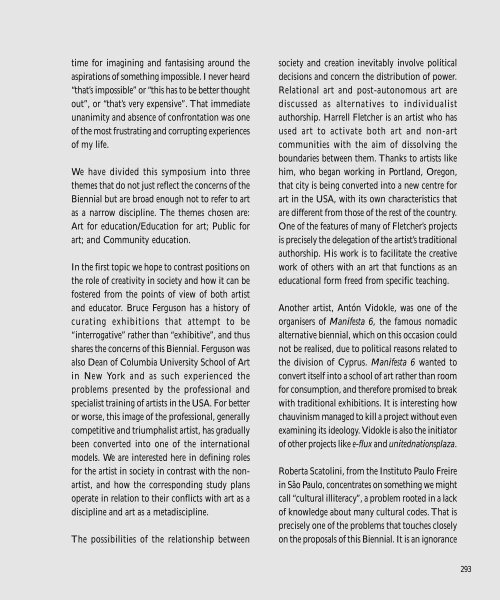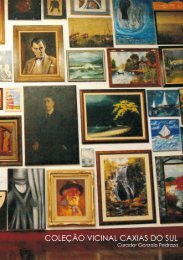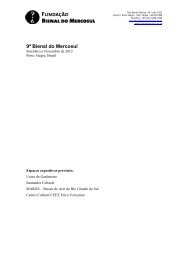- Page 3 and 4:
Educação para a arte Arte para a
- Page 5:
Educação para a arte Arte para a
- Page 9:
Pedagogia do grão: formação, col
- Page 13 and 14:
* Artista, pedagogo e curador, Luis
- Page 15 and 16:
câmbio de premissas. Mais do que f
- Page 17 and 18:
dados históricos, propondo a obra
- Page 19 and 20:
go de leitura bastante complexo, um
- Page 21 and 22:
nhecimentos. O fato é que é neces
- Page 23 and 24:
No primeiro assunto, esperamos cont
- Page 25 and 26:
3 Santiago Eraso, “El maestro ign
- Page 27 and 28:
entusiasmo, contradisse meu sentido
- Page 29 and 30:
* Crítico e curador independente,
- Page 31 and 32:
Esse ambiente cultural, combinado
- Page 33 and 34:
menos de 20 anos, mas surpreendente
- Page 35 and 36:
maneira autêntica. Cursos no estil
- Page 37 and 38:
enfatiza a noção de “sucesso”
- Page 39 and 40:
anônimo que espera para ser libert
- Page 41 and 42:
* Artista plástico. Participou de
- Page 43 and 44:
1 Em inglês, audience. N.T. As bie
- Page 45 and 46:
alguns dos poucos lugares onde se e
- Page 47 and 48:
sem valer. Eu diria que a possibili
- Page 49 and 50:
* Artista e professor de Artes na P
- Page 51 and 52:
de primeira mão, e a pesquisa em l
- Page 53 and 54:
fazenda de oito hectares situada no
- Page 55 and 56:
ma de um prédio autossustentável,
- Page 57 and 58:
Walter Passei dois anos fora, entre
- Page 59 and 60:
Aprendendo a amar-se mais Em 2002,
- Page 61 and 62:
tos e também a organizar os seus d
- Page 63 and 64:
Basicamente, o que eu estou tentand
- Page 65 and 66:
iniciar esta conversa, considero im
- Page 67 and 68:
2 Citação de edição francesa da
- Page 69 and 70:
simplesmente obras prontas e trabal
- Page 71 and 72:
4 Bertold Brecht (1898- 1956), poet
- Page 73 and 74:
como seres integrados e, principalm
- Page 75 and 76:
mentar que o termo “espaço públ
- Page 77 and 78:
1 Frazer Ward, ‘The Haunted Museu
- Page 79 and 80:
de poder e conhecimento através do
- Page 81 and 82:
um falso problema. A política não
- Page 83 and 84:
coordenadas de desterritorializaç
- Page 85 and 86:
5 Cornelius Castoriadis, World in F
- Page 87 and 88:
Em termos de produção de exposiç
- Page 89 and 90:
* Graduado em letras e filosofia. D
- Page 91 and 92:
4 Friederich Engels: La situación
- Page 93 and 94:
to, para a invenção de todo tipo
- Page 95 and 96:
9 Arantxa Rodriguez: “Nuevas pol
- Page 97 and 98:
14 Luc Boltanski/Eve Chiapelle: El
- Page 99 and 100:
15 e-sevilla.org: Plataforma para l
- Page 101 and 102:
17 Juan Luís Moraza: Incógnitas (
- Page 103 and 104:
ativos - que permitem reinterpretar
- Page 105 and 106:
temporário do modelo bienal, não
- Page 107 and 108:
plexidade da obra. Para dar um exem
- Page 109 and 110:
um novo trabalho, negociando entre
- Page 111 and 112:
1 Texto do website, Isuma Igloolik
- Page 113 and 114:
ecentemente, abaixo do nível do ma
- Page 115 and 116:
3 Jeanne van Heeswijk e Herve Parap
- Page 117 and 118:
5 It Can Change, texto do projeto,
- Page 119 and 120:
consumida a partir de diversos pont
- Page 121 and 122:
6 Alguns pensamentos meus sobre o p
- Page 123 and 124:
* Doutor em Educação e Professor
- Page 125 and 126:
Se considerarmos que a modernidade
- Page 127 and 128:
Essa ideia de que a verdade sobre o
- Page 129 and 130:
de, só funciona porque cada indiv
- Page 131 and 132:
estaurasse o sentido da comunidade,
- Page 133 and 134:
como uma espécie de vontade social
- Page 135 and 136:
E, dessa maneira, “se a pluralida
- Page 137 and 138:
Bibliografia BARCELONA, Pietro. Pos
- Page 139 and 140:
dade de um fenômeno que chamamos l
- Page 141 and 142:
trico e chega nos povoados, nas cid
- Page 143 and 144:
em diversos formatos segundo as car
- Page 145 and 146:
capacidades criativas. Esses meios
- Page 147 and 148:
metafórico em mim. A que quero apo
- Page 149 and 150:
e criou a mulher da costela do Adã
- Page 151 and 152:
tende rapidamente a proposta, a den
- Page 153 and 154:
Espaços em processo de construçã
- Page 155 and 156:
Nesse 31 de agosto de 1991, estáva
- Page 157 and 158:
aquilo que remete à complexidade d
- Page 159 and 160:
A linguagem Entendemos a linguagem
- Page 161 and 162:
a próxima em via ovni. Diego, o lo
- Page 163 and 164:
discursos para depois fazer que o
- Page 165 and 166:
parece ser que dar aos outros é um
- Page 167 and 168:
evitar o prazer mórbido e a captur
- Page 169 and 170:
fragmento sonoro foi o de indagar a
- Page 171:
Criança: — Não, mais nada. Prof
- Page 175 and 176:
El año 2007 representó un importa
- Page 177 and 178:
Introducción Luis Camnitzer En alg
- Page 179 and 180:
apreciación del arte? ¿Cómo se p
- Page 181 and 182:
alumnos que hagan algo que consider
- Page 183 and 184:
describimos este proyecto, siempre
- Page 185 and 186:
damental de la Secretaría Municipa
- Page 187 and 188:
Arte y educación Bruce Ferguson Es
- Page 189 and 190:
discusión de mis observaciones sob
- Page 191 and 192:
interdisciplinario es difícil y co
- Page 193 and 194:
puede hacer es promover las mejores
- Page 195 and 196:
común. (Hannah Arendt, 1977 p. 196
- Page 197 and 198:
Para aclararlo mejor, el arte tiene
- Page 199 and 200:
dades locales cancelaron abruptamen
- Page 201 and 202:
Algunas ideas sobre Arte y Educaci
- Page 203 and 204:
co-escrito un importante libro sobr
- Page 205 and 206:
niños. Uno de mis escritores prefe
- Page 207 and 208:
para conseguir una presentación en
- Page 209 and 210:
la calidad de los eventos que organ
- Page 211 and 212:
En la mesa de apertura los particip
- Page 213 and 214:
alfabetización, desde una perspect
- Page 215 and 216:
mite reflexionar, experimentar, ni
- Page 217 and 218:
Sobre la Producción de Públicos o
- Page 219 and 220:
privado (la familia, la casa, la pr
- Page 221 and 222:
co espectador, un grupo, alguien qu
- Page 223 and 224:
construcción imaginaria y profesio
- Page 225 and 226:
tampoco exclusivamente en la llamad
- Page 227 and 228:
Texto/Contexto. Tejido/Redes. Santi
- Page 229 and 230:
la utilización “sin compromiso
- Page 231 and 232:
política urbanística se ha articu
- Page 233 and 234:
encuentra el artista cuando se ve a
- Page 235 and 236:
los eventuales efectos secundarios
- Page 237 and 238:
Público para el arte/ Arte para el
- Page 239 and 240:
“Treasure Hunt” o “búsqueda
- Page 241 and 242: Ideas para el archipiélago Ted Pur
- Page 243 and 244: Allí habrá tiendas, bancos y una
- Page 245 and 246: Toda investigación que produce se
- Page 247 and 248: cosas en común, pero en su base ca
- Page 249 and 250: 1 Texto de la página web, Isuma Ig
- Page 251 and 252: inundan su camino” (Bauman, 2001:
- Page 253 and 254: pluralismo de sentidos, nos vemos t
- Page 255 and 256: interés público. Se desintegraron
- Page 257 and 258: que lo más importante para cada un
- Page 259 and 260: tanto de su incompatibilidad. Si in
- Page 261 and 262: al aire en directo a través de la
- Page 263 and 264: acontecer en ese espacio interstici
- Page 265 and 266: a lo humano de su ropaje, desnudand
- Page 267 and 268: costillas de…” cuando alguien s
- Page 269 and 270: Era muy interesante el hecho de la
- Page 271 and 272: en Marte que la Tierra está mal po
- Page 273 and 274: palabra, sino como posible efecto d
- Page 275 and 276: Sube la música Dr. Valle: —Yo di
- Page 277 and 278: salud en términos de “ayudar a r
- Page 279 and 280: un taller de charla y reflexión qu
- Page 281: Biografías Luis Camnitzer Artista,
- Page 285 and 286: 2007 represented an important step
- Page 287 and 288: Introduction Luis Camnitzer At some
- Page 289 and 290: simultaneously when the artist gene
- Page 291: curatorial exercise, a small beginn
- Page 295 and 296: He tries to reposition the public i
- Page 297 and 298: Art Education Bruce Ferguson It is
- Page 299 and 300: from a belief in text and language
- Page 301 and 302: fiscal planning, the mastery of int
- Page 303 and 304: e measurable. It is the text attach
- Page 305 and 306: From exhibition to school, notes fr
- Page 307 and 308: point out some possible models and
- Page 309 and 310: efusing easy conventions you have m
- Page 311 and 312: Sometimes I wind up working with th
- Page 313 and 314: practice I mean the dominate way of
- Page 315 and 316: Cleveland is a thoughtful and patie
- Page 317 and 318: psychology dept, the systems analys
- Page 319 and 320: Education for Art/ Art for educatio
- Page 321 and 322: 1961). And in this respect the lang
- Page 323 and 324: situation, its causes and consequen
- Page 325 and 326: Further information: http://www.cul
- Page 327 and 328: in the post modern, been heavily cr
- Page 329 and 330: more than one sense, and in a sense
- Page 331 and 332: etween representation and depresent
- Page 333 and 334: can appear so through praxis and be
- Page 335 and 336: Text/Context. Fabric/Webs Santiago
- Page 337 and 338: artistic - is ‘only’ concerned
- Page 339 and 340: For some decades one would travel t
- Page 341 and 342: (Navarra) to commemorate his presen
- Page 343 and 344:
To bring about a change in the usua
- Page 345 and 346:
Public for art/ Art for the public
- Page 347 and 348:
The great question would therefore
- Page 349 and 350:
Thoughts for the archipelago Ted Pu
- Page 351 and 352:
for a public art project was concei
- Page 353 and 354:
that it was time to start “constr
- Page 355 and 356:
alternate sociality, a free meal...
- Page 357 and 358:
Contemporary utopias for collective
- Page 359 and 360:
itself, since the possibility of an
- Page 361 and 362:
the performance of success and pros
- Page 363 and 364:
supported by reason, by the univers
- Page 365 and 366:
ves the problem of injustice and so
- Page 367 and 368:
Web-makers of diffusion Alfredo Oli
- Page 369 and 370:
the unforeseen, to emerge. This is
- Page 371 and 372:
elationship between the productions
- Page 373 and 374:
August 3, 1991 (first recording of
- Page 375 and 376:
“Ever, you go out with the questi
- Page 377 and 378:
alludes to madness, and they are un
- Page 379 and 380:
conditions for communicability, und
- Page 381 and 382:
and subjectifying proposals, making
- Page 383 and 384:
desired production spaces in the co
- Page 385 and 386:
promoting their circulation, reduci
- Page 387 and 388:
I invite you to look and listen, an
- Page 390 and 391:
Da esquerda para direita e de cima
- Page 392:
Oficina “E surge um Espaço...”
- Page 395 and 396:
Da esquerda para direita e de cima
- Page 397 and 398:
FUNDAÇÃO BIENAL DE ARTES VISUAIS
- Page 399:
Patrocinador Apoiadores Apoiadores




